
WHEN COMMANDING THE SACRISTAN |
He had studied so much, perhaps too much for his Bergamo people. Peasants, full of faith who had come to his first Holy Mass to listen to him. And he, who knew them well, did not want to disappoint them. So he asked the sacristan ...
Angelo Giuseppe Roncalli, the future John XXIII, was born in Sotto il Monte (Bergamo) on 25 November 1881, the fourth of thirteen brothers and sisters and the first male of the family. The Roncalli family enjoys a reputation for great religiosity and the children are educated by the example and family discipline: the common evening rosary and prayers, love and harmony accompany the hard work of the fields. At that time, in Sotto il Monte the school included only the first three elementary classes: at the age of ten, the peasant children began working in the fields and helped with household chores.
But for Angelo Giuseppe an exception is made: given his deep passion for study, he can continue to study, first in private, at the parish priest of Carvico and then, as an outsider, at the Collegio di Celana, thus succeeding in finishing primary school. and to carry out the first studies of Latin, so much so that, in the autumn of 1893, at the age of twelve, he can enter the Bergamo Seminary and be admitted to the third gymnasium class.
The vocation to the priesthood is born in the boy almost naturally and as Pontiff, Angelo Giuseppe will say "he never doubted that life should reserve him any other fate" than that of being a priest. In Seminary he comes into contact not only with the sacred sciences, but also with the human and social problems that filter into that cenacle through the echoes of the lively industriousness of the Catholic movement present in Bergamo. Angelo becomes a priest. Then, another exception for the young cleric: he is so early in his studies - at the end of 1900, at the age of 19, he already started the third course in Theology - that his superiors sent him to Rome to improve, since the ecclesiastical laws allow priestly ordination only at the age of 23, and on 13 July 1904 he graduates in sacred theology. On 10 August of the same year, in the church of Santa Maria in Monte in Piazza de Popolo, Angelo Roncalli was ordained a priest, and the following day celebrated his first Holy Mass in St. Peter's Basilica.
That day, for him unforgettable, ends with another auspicious event. Confused among the crowd of pilgrims, Don Angelo is close to the Pope, and those accompanying him present him to Pius X saying: "Your Holiness, this is a young priest from Bergamo who celebrated his first Mass this morning." The Pope stops, leans over him and says: "Bravo, I encourage you to honor your intentions". Then he takes a few steps towards other pilgrims, but immediately goes back and asks him: - And when will you sing the first Mass in your country? - For the Assumption, Holy Father. The old Pontiff smiles and adds: - For the Assumption. Who knows what a party! And those Bergamo bells, that sound ... that sound ... And so on August 15th 1904, Sotto il Monte welcomes the young priest for the first Holy Mass. Don Angelo goes to the pulpit for the first sermon to the Gospel. At his feet, hidden by the parapet, there is the sacristan who has been commissioned to pull on his cassock if the sermon is too difficult; Don Angelo in fact, after so many years of studies, does not want to run the risk of not being understood by his fellow villagers. But the sacristan does not intervene and so the new priest pauses and looks at him for advice. "Come on, don Angelo," the sacristan murmurs, "we understand everything. It's as clear as water!"
|
SON OF PEASANTS |

These simple and human words, with which the new Patriarch Angelo Giuseppe Roncalli presents himself to the Venetians on March 15, 1953, shortly summarizing his entire biography. "I want to talk to you with the utmost sincerity of heart and speech ... things have been told to me that far surpass my merits. I humbly introduce myself the same.
Like every other man living down here, I come from a family and a well-defined point: with grace and good physical health with a bit of common sense to make me see things soon; with a disposition to the love of men that keeps me faithful to the law of the Gospel, respectful of my and other people's law, which prevents me from harming anyone, on the contrary, which encourages me to do good  to all. I come from humility and was educated in a contented and blessed poverty that has few needs, which protects the flourishing of the noblest and highest virtues and prepares for the high ascensions of life. Providence drew me from my native village and made me walk the roads of the world in the East and in the West, approaching people of different religions and ideologies, in contact with acute and threatening social problems and keeping me calm is the balance of investigation and appreciation, always worried, saves firmness to the principles of the Catholic Creed and of morality, more than what unites, rather than what separates and raises contrasts ... ".
to all. I come from humility and was educated in a contented and blessed poverty that has few needs, which protects the flourishing of the noblest and highest virtues and prepares for the high ascensions of life. Providence drew me from my native village and made me walk the roads of the world in the East and in the West, approaching people of different religions and ideologies, in contact with acute and threatening social problems and keeping me calm is the balance of investigation and appreciation, always worried, saves firmness to the principles of the Catholic Creed and of morality, more than what unites, rather than what separates and raises contrasts ... ".
|
BULGARIA, TURKEY, GREECE |
|
TO BE FRIEND OF EVERYONE |
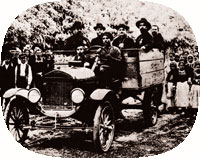 A shepherd from the beginning. This was the novelty that Angelo Roncalli brought with him in his service in the three countries where the Catholic Christian communities were small in number. A pastor concerned about establishing relationships with everyone.
A shepherd from the beginning. This was the novelty that Angelo Roncalli brought with him in his service in the three countries where the Catholic Christian communities were small in number. A pastor concerned about establishing relationships with everyone.
|
IN BULGARIA |

3 March 1925: Pius XI appoints Msgr. Roncalli apostolic visitor to Bulgaria, with an episcopal function. "In truth - writes the new prelate - being nominated bishop or remaining a simple priest is worth something for the eyes, but it does not say much to the spirit of those who seek the glory of the Lord and not the evanescent glow of earthly satisfaction ...
But the spirit is calm and the heart in peace. I do obedience by winning strong repugnance at leaving certain things and venturing into certain others. Yes, "Obedientia et pax": here is my motto. May it always be. "On this episcopal motto, Archbishop Roncalli has meditated for a long time: for the rest of his life he will be the truest expression of his program.
On March 19, 1925 he was consecrated bishop in Rome and on April 25 he entered Sofia, the capital of Bulgaria, finding an environment that did not bode well. Above all, the Slavic Catholic populations of Macedonia and Thrace have been tried, forced by the war to abandon their lands to find refuge in Bulgaria where they find themselves dispersed and without a religious leader. Mgr. Roncalli immediately receives, the day after his arrival, the heads of the Catholic communities, who he then personally visits with numerous trips throughout the country, bringing to each his help and his blessing; and a year later he succeeded in reassuring those Catholics in the faith, having appointed the abbot Stephen Kurtev as apostolic administrator for Bulgaria and giving the Church of Bulgaria a solid organization.
|
APOSTOLIC DELEGATE IN ISTANBUL |

In November 1934, Msgr. Roncalli receives the appointment as apostolic delegate in Turkey and Greece, with a permanent residence in Istanbul. Here Catholics are even less than in Bulgaria and religious life in these countries is not easy. A few months after the arrival in Istanbul of Msgr. Roncalli, the Turkish Government issues a law that prohibits priests from using the sacred habit; on the other hand, in the Turkey of those times, still strongly influenced by the state secularism of Kemal Ataturk, the Government does not officially recognize the existence of pontifical representation, so the delegate must always be on guard to avoid being accused of transgressing in any way the laws of the State. Also in Greece, Msgr. Roncalli has to deal with the prohibition of any religious propaganda and with the suspicion with which the faithful of Rome are seen, in a country of strict Orthodox observance. But he knows how to practice patience and charity in a way that is out of the ordinary, always acting with the utmost prudence and succeeding in smoothing out quite a few difficulties.
He then continues to actively cultivate friendly relations with the representatives of the Orthodox Churches, which he already practiced during his stay in Bulgaria. As a religious from down there writes at his departure from Sofia: "With his personal action, his affability, his understanding of the situation, he effectively contributed to the rapprochement of the spirits, dispelling many prejudices that persisted in certain circles". In Turkey, and especially in Greece, this ecumenical apostolate continues: "Everything that was Christian attracted him - writes Mgr. Vuccino, Greek Catholic archbishop.
He gladly beat the doors of the Orthodox monasteries and churches to admire and venerate thet icons, the marvelous mosaics, the manuscripts of ancient times. He also went to visit the monks  of Mount Athos, all amazed to see among them the representative of the bishop of ancient Rome ". He also visits the Orthodox patriarch of Constantinople in his headquarters in the Fanar and wants to give Catholic ceremonies a liturgical majesty which the brothers of the East are favorably impressed: when Pius XI dies in the Catholic cathedral of Istanbul, all the representatives of the Orthodox and Eastern Catholic Churches are invited for the pontifical in suffrage of the deceased, the rite taking place with a splendor never seen in Istanbul and Monsignor Roncalli wants that, at the end of the pontifical, the five acquittals at the mound, in use for the death of a Pope, are given, in addition to him personally, by four representatives of the Eastern rites: in the storm of war. World War II, Archbishop Roncalli works actively for refugees, wounded, prisoners of war, protects Italian populations and soldiers ani (after September 8, 1943) by the Germans, even managing to get Athens, like Rome, to be declared an "open city" by the two warring parties, saving it from bombing. Especially noteworthy is his expertise in removing the Jews from the ruthless hunting that Nazi troops and his successful intervention to mitigate the blockade of the English fleet on the coasts of Greece, which allows the importation of food that saves the Greek people from hunger.
of Mount Athos, all amazed to see among them the representative of the bishop of ancient Rome ". He also visits the Orthodox patriarch of Constantinople in his headquarters in the Fanar and wants to give Catholic ceremonies a liturgical majesty which the brothers of the East are favorably impressed: when Pius XI dies in the Catholic cathedral of Istanbul, all the representatives of the Orthodox and Eastern Catholic Churches are invited for the pontifical in suffrage of the deceased, the rite taking place with a splendor never seen in Istanbul and Monsignor Roncalli wants that, at the end of the pontifical, the five acquittals at the mound, in use for the death of a Pope, are given, in addition to him personally, by four representatives of the Eastern rites: in the storm of war. World War II, Archbishop Roncalli works actively for refugees, wounded, prisoners of war, protects Italian populations and soldiers ani (after September 8, 1943) by the Germans, even managing to get Athens, like Rome, to be declared an "open city" by the two warring parties, saving it from bombing. Especially noteworthy is his expertise in removing the Jews from the ruthless hunting that Nazi troops and his successful intervention to mitigate the blockade of the English fleet on the coasts of Greece, which allows the importation of food that saves the Greek people from hunger.
|
THE DOOR ALWAYS OPEN |
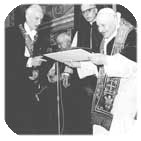
In the farewell address to the Bulgarian Catholics Msgr. Roncalli thus manifests all his affection and his sorrow for the detachment: "According to an Irish tradition, all the houses put on the window, on Christmas night, a lighted candle, to indicate to Mary and to Saint Joseph, that they seek a refuge in the Holy night, that there is room for them in that house, well, wherever I am, even at the end of the world, if a Bulgarian passes in front of my house he will always find a burning candle at the window. He can knock at my door and it will be opened; whether Catholic or Orthodox, he will be able to enter and find in my house the warmest and most affectionate hospitality ".
|
IN POST-WAR FRANCE |

In the home of the French revolution, the prejudices against the Catholic Church were hard to die. And the war just ended favored them. But the amiability of Angelo Roncalli was able to break even in the most anticlerical hearts. In December 1944 Msgr. Roncalli receives a telegram from the Secretariat of State: "Come immediately. Nuncio transferred to Paris. Tardini". That "come immediately" is imperative. Roncalli leaves immediately. And even after 48 hours from the departure from Istanbul, after having passed by Rome to receive confirmation from the Pope himself, Msgr. Roncalli lands at Orly airport. In Paris, Msgr. Roncalli immediately gives proof of his diplomatic ability, always united to the greatest charity. The situation of the Church in France is not at all rosy; the country since 1939 is going through a period of the most sad of all its history: the military defeat, the occupation, the resistance, the two national Governments, the liberation ... Inevitably, in the hour of the final triumph of the Resistance, all the surviving institutions under the Germans are put on trial and among them the Church: the Nuncio, Msgr. Valeri, the Bishops and the Catholic organizations. A biased propaganda, 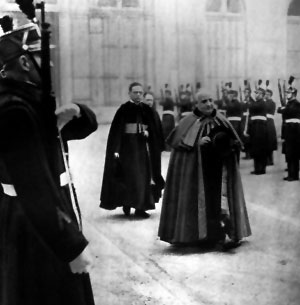 especially supported by the communists, exasperates the minds by accusing the Church of conniving with the German enemy, while in reality, both the Nuncio and the Bishops have simply tried to save what can be saved, helping among other things Jews and persecuted politicians to flee by German troops. The Nuncio does not, however, limit his activity to official contacts with the Government to resolve pending issues (another problem addressed and resolved is that of subsidies to Catholic schools, abolished in 1945), but it is a valid support and animator of the Church of France, in these difficult years of recovery after the horrors and divisions of war. He went around the country for a long time, always present at religious ceremonies and at meetings of bishops and priests, at congresses and study sessions.
especially supported by the communists, exasperates the minds by accusing the Church of conniving with the German enemy, while in reality, both the Nuncio and the Bishops have simply tried to save what can be saved, helping among other things Jews and persecuted politicians to flee by German troops. The Nuncio does not, however, limit his activity to official contacts with the Government to resolve pending issues (another problem addressed and resolved is that of subsidies to Catholic schools, abolished in 1945), but it is a valid support and animator of the Church of France, in these difficult years of recovery after the horrors and divisions of war. He went around the country for a long time, always present at religious ceremonies and at meetings of bishops and priests, at congresses and study sessions.
|
THE HOTTEST PROBLEMS |
In 1950 he also visited the French territories of northern Africa, thus describing his tour in a letter in short: "I traveled in 38 days of traveling ten thousand kilometers by car, following the course of the Arab invasion. From Tunisia, across the Algeria and Morocco ... Among the big and small speeches, mostly small ones, I had to improvise fifty times ... And I didn't suffer anything except a cold taken by visiting the Escorial. A day of fasting and rest at the Nunciature of Madrid set me in motion ". Faced with the question of" worker-priests ", Archbishop Roncalli maintains an attitude of prudent expectation until he remains as Nuncio, the experiment can be continued, despite the limitations that experience can advise him on, one of his principles is that "without a little holy madness the Church does not enlarge its pavilions".
|
DINAMISM AND CORDIALITY |
 In the years that he remained in Paris, the Nuncio conquered France with his disarming cordiality, his modesty and with charity extended to all, without any distinction, so much so as to openly declare: "I often find myself more at ease with a atheist or a communist, rather than with certain Catholics, fanatics ". He maintains contact with all classes, even with parliamentarians and government men who belong to parties opposed to the Church, multiplying human contacts with his brilliant and shrewd conversation, full of human warmth. During a diplomatic reception, for example, the nuncio Roncalli realizes that the Soviet ambassador Bogomolov stands aside, disgruntled. Approaches him and attacks button in a rather unusual way for a diplomat: "Excellency, - he said, - we are militating in opposite camps, but we have one important thing in common: the belly. We are both round ..." Bogomolov laughs heart, the ice is broken.
In the years that he remained in Paris, the Nuncio conquered France with his disarming cordiality, his modesty and with charity extended to all, without any distinction, so much so as to openly declare: "I often find myself more at ease with a atheist or a communist, rather than with certain Catholics, fanatics ". He maintains contact with all classes, even with parliamentarians and government men who belong to parties opposed to the Church, multiplying human contacts with his brilliant and shrewd conversation, full of human warmth. During a diplomatic reception, for example, the nuncio Roncalli realizes that the Soviet ambassador Bogomolov stands aside, disgruntled. Approaches him and attacks button in a rather unusual way for a diplomat: "Excellency, - he said, - we are militating in opposite camps, but we have one important thing in common: the belly. We are both round ..." Bogomolov laughs heart, the ice is broken.
|
CONNOISSEUR OF PEOPLE |
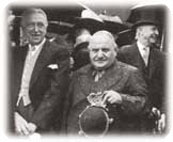
When Msgr. Roncalli leaves France at the beginning of 1953, after being nominated Patriarch of Venice, all the sympathy of the French people is with him. And at the farewell lunch it is precisely Herriot, a radical with a reputation as anticlerical, who explains the reasons for the prestige acquired by Roncalli in France: "The French people will not forget the goodness, the delicacy of the line, the proof of friendship received, having known not, only in the guise of a diplomat, but of an ancient who visited France going as far as the African coasts, a scholar of ancient pages and at the same time a connoisseur of men.The French people, not without flaws, are seduced by the goodness of the heart: such goodness has found in the Nunzio, this Italianized French, and to you he has cordially opened up ".And on January 15, 1953, when President Auriol imposed the cardinal's hat on him, as tradition allows the heads of state of some Catholic countries, the Elysium was the scene of an unforgettable scene: the moment Roncalli kneels to receive the cap the president makes the act of escaping; then, while the chief protocol throws him striking glances, Auriol leans over the Cardinal and tells him in a trembling voice: "No, Eminence, get up, get up: it is I who must kneel before you ..."
|
THE HUMBLE PATRIARCH OF THE SERENISSIMA |

When he arrived in Venice, he hoped that the lagoon city would be his last stop on the long journey following Divine Providence, which he had always obeyed. But it wasn't really like that. A train to Rome ...
In the Consistory of 12 January 1953, Pius XII created Msgr. Cardinal Roncalli, and he named him Patriarch of Venice, where he made his entrance on March 15th. The Venetians immediately baptized him "the calm after the storm", succeeding the patriarch Agostini, an austere and closed man, an ascetic and a tireless worker. At the age of seventy-two, for card. Roncalli begins a new life and he hopes it is truly the last. In Venice he finally found what he always wanted from the day of his priestly ordination: immediate pastoral work, in close contact with the priests and the people.
As soon as he arrived, he devoted himself to the pastoral visit, interrupted by the death of his predecessor, and ended it with the convocation of a diocesan synod. In the five and a half years of Patriarchate, he builds thirty parishes and increases Catholic Action; makes the Golden Basilica to greater splendor and places the remains of its predecessors in the crypt; equips the patriarchal residence with a more dignified seat and reorganizes the diocesan archives; is present, with advice and warnings in the various civil, political and cultural events in the city. He also returned to the East in 1954, as Pontifical Legate at the Marian National Congress in Beirut (Lebanon), and in France, in 1958, to consecrate the grandiose underground Basilica of Lourdes dedicated to St. Pius X. In Venice, which sent him back sentimentally to the East, it continues its ecumenical apostolate, seeking contacts with the "separated brothers" and participating each year in the Octave for the Unity of the Churches with homilies and conferences, which express all the anxiety of his soul for the matter. "The road to the union of the various Christian denominations - he says bravely - is charity, so little observed by either party".
Roncalli patriarch of Venice, an unforgettable memory. The new Patriarch leads a modest life, without pomp, without formal barriers; occasionally appears in the streets and squares, accompanied only by the secretary, and takes long walks stopping to converse with acquaintances and strangers, also trying to express himself in Venetian dialect and making friends with the gondoliers. Arriving in Venice, he immediately lets it be known that anyone can go and see him, without any formality, because, he says, "anyone can need to confess and I cannot refuse the confidences of a soul in pain". And in fact, according to a textual expression attributed to a Venetian by a newspaper, "he received without even the last of the beggars". Soon the Venetians realize that behind this simplicity lies a man of extraordinary culture, a man who, as the newspaper reports, "had a whole  library in his head". In fact, Patriarch Roncalli, a scholar of historical studies and connoisseur of different foreign languages, has traveled extensively and his multi-faceted experience gives him the confidence that enchants scholars as well as the ignorant. When he leaves Venice for the Conclave, after the death of Pius XII, a large crowd accompanies him to the station making him loudly his wishes for a good journey and a good job. The scene is the same as 55 years before, when, another Patriarch of Venice, Cardinal Giuseppe Sarto, leaves for Rome to participate in the Conclave; the crowd perhaps feels that this time too the Patriarch will never return to Venice- Judging from the crowded crowd of Venetians to greet the departing, one would say yes indeed. For the Cardinal Patriarch, instead, as his secretary, Msgr. Capovilla, "the calm of all time ... No personal documents with him; not even the personal testament that at other times, on leaving for Lebanon, for example, or for Spain, he had highlighted". Patriarch Roncalli goes to quiet Rome, a "parenthesis" before returning to Venice, where he now thinks he has found the place of his definitive work and rest, after so many peregrinations around the world. But Providence has once again arranged things differently.
library in his head". In fact, Patriarch Roncalli, a scholar of historical studies and connoisseur of different foreign languages, has traveled extensively and his multi-faceted experience gives him the confidence that enchants scholars as well as the ignorant. When he leaves Venice for the Conclave, after the death of Pius XII, a large crowd accompanies him to the station making him loudly his wishes for a good journey and a good job. The scene is the same as 55 years before, when, another Patriarch of Venice, Cardinal Giuseppe Sarto, leaves for Rome to participate in the Conclave; the crowd perhaps feels that this time too the Patriarch will never return to Venice- Judging from the crowded crowd of Venetians to greet the departing, one would say yes indeed. For the Cardinal Patriarch, instead, as his secretary, Msgr. Capovilla, "the calm of all time ... No personal documents with him; not even the personal testament that at other times, on leaving for Lebanon, for example, or for Spain, he had highlighted". Patriarch Roncalli goes to quiet Rome, a "parenthesis" before returning to Venice, where he now thinks he has found the place of his definitive work and rest, after so many peregrinations around the world. But Providence has once again arranged things differently.
|
THE UNBELIEVABLE GAG |
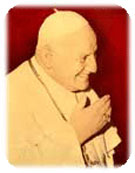
The innate sense of good humor of the future Pope can fully expand in Venice, in the natural setting of a city brought to appreciate the ready joke. "For heaven's sake - the Patriarch is recommended - do not report my malcaute sentences!" But his jokes pass from mouth to mouth. One day, conversing with one of the richest men in the city, he tells him: "You and I have something in common: money. You have a lot of it and I have none at all, the difference is that I don't care."
Another time, to a journalist who asked him what he would do if he could start his life again, he replied: "The journalist". Then, with an amused smile, he adds: "And now let's see if you will have the courage to tell me that, being able to be reborn, you would be a Patriarch!" to another interviewer too curious: "But you would be able to ask me how many buttons my petticoat has ...".
|
APPARENTLY APPRENTICE |

Thus it would seem from a superficial glance, Angelo Roncalli at the beginning of his pontificate. Yet from John XXIII he was able to give himself a precise program, facing burdensome commitments and loads of great consequences. Never forgetting that the Pope's first task is that of prayer. If the Catholic world was astonished at the announcement of the election of Card. Roncalli, of whom little had been said before the Conclave, and little was known, certainly he must have been even more astonished, he who was elected, who certainly did not think of such a person eventualities. Yet from the beginning, although he kindly defined himself as "an apprentice Pope" and said "let me do my novitiate", he faced the first difficult steps with his usual calm.
On the same evening of the "urbi et orbi" blessing, he replied to the secretary, who asked him which important problems he wanted to deal with first, "Now I take the Breviary and recite Vespero e Compieta". In the two initial speeches of October 29, his first radio message in the world, and of November 4, the day of the coronation, John XXIII already traced the very precise program of his Pontificate, later realized with great tenacity. "Above all we want to insist that the task of a shepherd of the whole flock is of particular importance to us. All other human qualities - science, diplomatic tact and organization, organizational qualities - can succeed in embellishment and completion for a pontifical government, but in no way can they replace it, but the central point is the zeal of the "good shepherd", ready for every sacred daring, linear, constant, up to the extreme sacrifice ".
A clearly pastoral program. But also ecumenical and missionary, that is aimed at the conquest of the distant: "The horizon widens:" I have other sheep that are not of this fold, they too must bring them back and they will hear my voice and a single fold will be made under one shepherd (Jn 10, 16). Here is the missionary problem in all its vastness and beauty. This is the solicitude of the Roman Pontificate, the first, even if it is not the only one. "And again:" Let us open our hearts and arms to all those who are separated from this Apostolic See. We ardently desire their return to the house of the common Father ".
Finally, a program of keen interest in the problems of humanity, especially those of peace and social justice: "Let us now turn our appeal to the rulers of all nations, in whose hands fortunes, prosperity and hopes are placed of individual peoples, because disagreements and disagreements are not finally and fairly composed - because the resources of human genius and the riches of peoples are more often used to prepare weapons than to increase the well-being of all classes of citizens, particularly of those less well off - so put yourself to work, with confident courage and divine assistance ". Small but important innovations. Having clearly established the program of his pontifical action, John XXIII begins with the little things that, above all, indicate his style.
To the director of the Osservatore Romano he says that "the high and noble word of His Holiness" and other similar formulas should be abandoned, repealing the prohibition of every human presence in the Vatican gardens, during his walks, even stopping to talk to the gardeners, the Swiss guards, the masons. "I have read the Gospel carefully and I have found no prescription for prohibiting the Pope from eating together," he says to those who pointed out to him that the Popes eat their own meals; and since then there are often prelates and friends at Pope John's table. Pope John then begins to leave the Vatican walls frequently, even in this case breaking the tradition that the Pope wants almost isolated inside (in his little kingdom). The Romans soon get used to seeing him go around Rome, in visits to parishes and to hospitals, prisons and old sick friends, with their spirit always ready to beat, they begin to call him "John outside the walls".
|
THE POPE AND THE CHILDREN |

The meetings of the Good Pope with the children remained famous. When he visited those inmates at the Hospital of the Child Jesus, yes, he heard a small patient call him: "Come here, Pope, come here, Pope, .. He went to the cot and asked:" What's your name? "." Angelo, Pope "." See, dear little one, I used to call myself Angelo, but a few days ago they made me change the name ... Now my name is Giovanni. "In another ward of the same hospital a boy who had gone blind he said: "I know that you are the Pope, but I cannot see you. But I still want you to have a world of good. "Two tears appeared in Pope John's eyes and  perhaps for the first time he was left speechless. But the most moving episode was that of the hearing granted to the American child condemned by leukemia, who had expressed the desire to see the Pope before she died. The little girl wore the white dress of the First Communion and, with her > rosy and plump cheeks, she looked very healthy, but could hardly stand. Pope John went to meet her, took her hand and made her sit next to him. Then they "talked together" for about three quarters of an hour: what they said at that very long time, a time that the Pope rarely dedicated even to the major personalities, remains a mystery; all the more so if one thinks of the approximate English of Pope John and the little understandable "slang" of the American child. But the souls, simple and holy, that of the Pope and those of children, understand each other even without much talk.
perhaps for the first time he was left speechless. But the most moving episode was that of the hearing granted to the American child condemned by leukemia, who had expressed the desire to see the Pope before she died. The little girl wore the white dress of the First Communion and, with her > rosy and plump cheeks, she looked very healthy, but could hardly stand. Pope John went to meet her, took her hand and made her sit next to him. Then they "talked together" for about three quarters of an hour: what they said at that very long time, a time that the Pope rarely dedicated even to the major personalities, remains a mystery; all the more so if one thinks of the approximate English of Pope John and the little understandable "slang" of the American child. But the souls, simple and holy, that of the Pope and those of children, understand each other even without much talk.
|
A FREE SPIRIT |

It was immediately understood from the name, John XXIII, that something would have gone differently in the old world of the Church. Of Giovanni, in the history of the popes, there had been twenty-two. One had called himself John XXIII, but he was an antipope. Therefore, no pontiff had dared to assume that name. Roncalli took it, without fear of getting confused with a usurper of the chair of Pietro.
He was the exact figure opposite to those who had preceded him. Pius XII was diaphanous, hieratic, appeared to be gathered within his high sacredness, aristocratic, Roman pontiff, pastor above the world, Pastor angelicus. Of Giovanni XXIII, on the other hand, there is a splendid image that symbolically represents him. It is the one that shows him with the camauro on his head, that cap of red velvet edged with white fur, which makes him, a peasant from Bergamo, a placid and serene Renaissance pontiff. He had thrown it over his head to keep his ears warm. (Domenico Del Rio, from "Mondo e Missione" No. 6/2000)
|
THE NEW SPRING OF THE ECUMENICAL COUNCIL |
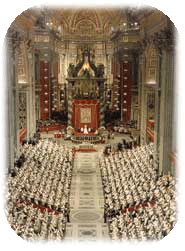
What is the slightly overused image that people have of John XXIII? That of the good-natured Pope. But it is an image that does not explain the personality of Angelo Roncalli, who was so good, but also a man of great culture and capable of decisions that will mark the life of the Church. A serious error of perspective would be to look at John XXIII as a Pope who exhausted his good-naturedness and prompt wit, all or a large part of his personality. In this case, he would not have been a great Pope.
While in reality it was, and how! It will suffice to recall some of his most noteworthy acts of government, to see how he really had his own precise plan of action, and he knew how to carry it out with a speed and an energy that would surprise even in one much younger than him. On November 17, 1958, the Osservatore Romano gave the announcement that the new Pope, in the Consistory of December 15, would create 23 new Cardinals, including the first African, and in fact foreigners become the absolute majority compared to Italians: the Sacred College is thus more internationalized.
|
ANNOUNCEMENT OF THE COUNCIL |
And here is January 25, 1959, the feast of the conversion of St. Paul. To the Cardinals gathered in the Basilica of St. Paul Outside the Walls, John XXIII announced "trembling a little with emotion, but together with a humble resolution of purpose" his plan to hold a diocesan synod for the diocese of Rome, an Ecumenical Council for the Church universal and the reform of the Code of Canon Law (the collection of all the laws governing the Latin Church), preceded by the promulgation of the Code of Oriental Law. The Cardinals are astonished, literally without a word, as struck by that announcement of such colossal undertakings that none of the preceding Pontiffs, even if we thought about it sometimes, had felt the soul to begin.
Pope John launches those proposals even before having them clearly in mind, even before he has already studied the plans to send them to effect; the Council's project above all, as he will later say, has not matured in him "as the fruit of prolonged meditation, but as the spontaneous flower of an unexpected spring"; and, in the message to the Venetian clergy of April 29, 1959, he adds: "For the announcement of the Ecumenical Council we have heard an inspiration; We have considered its spontaneity, in the humility of our soul, as an unexpected and unexpected touch" .
The boundless trust in God that John XXIII has always nourished led him to respond immediately to inspiration, even before he could ask himself how he could have done it in practice. But if the first announcement was almost timid and uncertain, afterwards the Pope's exhortation to prepare for the Council knows no respite: he speaks to the Cardinals and Bishops, to the pilgrims and private individuals he receives in audience, in short to those who can accelerate preparation and to those who cannot do anything about it; to all, however, assigns a task in the preparation of the Council, if only to pray: "We do not doubt to say - says in a speech of November 13, 1960 - that our diligences and our studies for the Council to succeed a great event, could remain in vain, if this collective effort of sanctification were less unanimous and less decisive. No element can contribute to it as and as much as sanctity, sought and achieved. Prayers, the virtues of individuals, the inner spirit become an instrument of immense good ". While the complex mechanism of the Ecumenical Council rapidly grinds the immense accumulation of studies and papers from every part of the Catholic world, while commissions and subcommittees, conciliar fathers and experts do an exorbitant job that normally would require much more time, here the others the Pope's projects reach maturity as soon as possible and are realized.
The Roman Synod, the first to be held in the holy city after the Council of Trent, was held in January 1960. Here then are the works for the revision of the Code of Canon Law which go hand in hand with those for the preparation of the Ecumenical Council, integrating with each other. And the legislative activity of Pope John does not stop there: other laws that perhaps the general public does not even notice, mark a profound renewal in the Church. Reopening the dialogue with the Anglicans, after four centuries of hatred and misunderstanding, banishes the attitudes of hostility towards the Jews, having the insults against "the perfidious Jews" removed from the missals, the first saint of color proclaims: a mulatto from Peru, a friar 'Martino de Porres.
|
THE POPE'S CARESS |
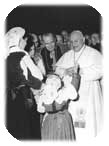
It is the evening of 11 October 1962, at the end of the torchlight that concludes the opening day of the Vatican II Ecumenical Council. Pope John in St. Peter's Square, in a familiar tone, pronounces those words that will conquer and move the whole world: "Dear children, I hear your voices. Mine is a voice, alone, but summarized the voice of the whole world: here the whole world it is represented. It would seem that even the moon rushed tonight, look at it up high, watching this show. My person counts for nothing: it is a brother who speaks to you, become a father by the will of our Lord ... But all together, paternity and fraternity and God's grace, everything all ... We therefore continue to love each other, to love each other like this; looking at ourselves in the meeting: catching what unites us, leaving aside, if there is anything, something that can keep us a bit in difficulty ... Returning home, you will find the children, caress your children and say: this is the Pope's caress. You will find some tears to dry: say a good word. The Pope is with us, especially in the hours of sadness and bitterness. And then, all together we animate: singing, .spiring, crying, but always full of trust in the Christ who helps us and who listens to us, we continue to resume our journey ".
|
THE IMMENSE STRENGTH OF CRISTIANITY |
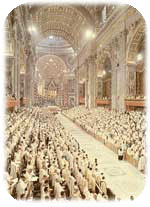
Where did Angelo Roncalli look at that positive man, so confident in his abilities? Not from a naive feeling, but from the awareness that what is in the heart of every man is a question of meaning, of God. Even to the man who seems to become "god" through scientific progress. With the last encyclical, "Pacem in terris", for the first time in the history of the Church, the Pope addresses not only the bishops, the clergy and the Catholic faithful, but "to all men of good will": to those that is, they believe in the existence of natural values that in every creature represent the mark of the Creator.
The encyclical is founded, on an optimistic vision of man and of human history, in the security that is that the healthy forces of all humanity respond positively to the peaceful appeal of the Vicar of Christ and that the events of human history, mysteriously guided by the Divine Providence, bring more and more men to a Christian vision of life, despite the often contrasting appearances.
|
A POSITIVE GLANCE |
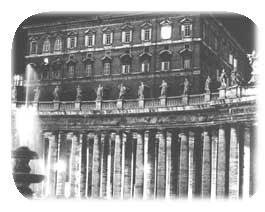
The greatness and the extraordinary popularity of Pope John derive, in large part, also from this his unalterable optimism towards man and the whole humanity, supported by an intrepid faith and by a strong sense of the divine, which allowed him to go meeting and establishing cordial contacts both with the separated brothers of the Orthodox and Protestant Churches, and with men of other faiths and ideologies, presenting the Church not as an ivory tower closed in defense of its otherworldly truths, but really as "the house of the common Father "open to all. John XXIII, firmly convinced of the immense strength that Christianity has in himself, did not fear any confrontation and was certain that the dynamics of truth, freedom and justice, once set in motion, would end up triumphing over malice and opportunism some men.
For this reason, Pope John was not frightened even in the face of the amazing advances in science and technology (he greeted human flight in the cosmos with a radio message), because he knew well that any scientific and technical progress, however extraordinary it may appear, always leaves without answer the ultimate questions that man places on himself and on the reasons for his presence in the universe: he knew that material progress always leaves behind the void of the soul that no human pride can ever fill.
|
THE PROGRESS IS NOT ENOUGH |
Angelo Roncalli knew that the so-called "free spirits" most of the time are nothing more than dissatisfied spirits, who can be regained by faith and hope only with understanding and humility, with a sincere appreciation of their human dignity and their good faith; he knew that sooner or later the single man, and finally all humanity, after having experienced the ephemeral intoxication that can give him progress for a few hours, would inevitably return to the dear and sweet ancient truths, to the simple faith of the child and of the old woman, who alone are worth more than all the machines built by human hands, of all her culture and of all scientific advances and alone can give the tranquility of conscience and peace in human relations.
|
WITH THE MISSIONS ALWAYS IN HIS HEART |
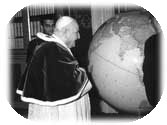 When the election to the supreme pontificate of Card. Roncalli was announced by the external lodge of St. Peter on October 28, 1958, those who knew well the life and thought of the new Pope agreed that John XXIII would be a missionary Pontiff. If the official beginning of Angelo Giuseppe Roncalli's missionary activity dates back to 19 July 21, when he is called to Rome by card. Van Rossum to direct the Italian organization of the Mission Societies, his interest in the missions goes back much earlier. On April 21, 1961, at the end of a meeting of the Preparatory Commission for the Missions, the Pope said confidentially that he had found some of his spiritual notes from when, at the age of fifteen, he studied at the seminary of Bergamo; in them there was the intention to pray always and intensely to the Lord for the "separated brothers" and for the needs of the missions, since, he added, precisely in those years he had begun to take an interest in missionary work through specialized publications. In the diocese of Bergamo, Don Roncalli was a keen animator of missionary cooperation and it is certain for this particular sensitivity, as well as for the chosen gifts of mind and heart, that Benedict XV called him to Rome in 1921, appointing him Director of the Opera della propagation of the Faith in Italy, with the task of reorganizing the Opera itself in our country.
When the election to the supreme pontificate of Card. Roncalli was announced by the external lodge of St. Peter on October 28, 1958, those who knew well the life and thought of the new Pope agreed that John XXIII would be a missionary Pontiff. If the official beginning of Angelo Giuseppe Roncalli's missionary activity dates back to 19 July 21, when he is called to Rome by card. Van Rossum to direct the Italian organization of the Mission Societies, his interest in the missions goes back much earlier. On April 21, 1961, at the end of a meeting of the Preparatory Commission for the Missions, the Pope said confidentially that he had found some of his spiritual notes from when, at the age of fifteen, he studied at the seminary of Bergamo; in them there was the intention to pray always and intensely to the Lord for the "separated brothers" and for the needs of the missions, since, he added, precisely in those years he had begun to take an interest in missionary work through specialized publications. In the diocese of Bergamo, Don Roncalli was a keen animator of missionary cooperation and it is certain for this particular sensitivity, as well as for the chosen gifts of mind and heart, that Benedict XV called him to Rome in 1921, appointing him Director of the Opera della propagation of the Faith in Italy, with the task of reorganizing the Opera itself in our country.
|
THE MISSIONARY SPIRIT |
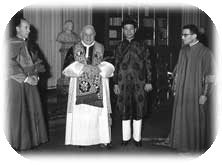
Mons. Roncalli remained in Rome from 1921 to 1925, until, that is, he was appointed apostolic visitor to Bulgaria: four years exclusively dedicated to missionary cooperation. At this time he was able to travel the 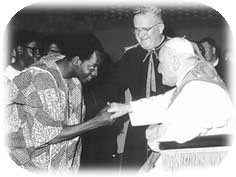 peninsula far and wide, unifying the various regional councils in a single national center; he also visited several foreign countries (France, Austria, Belgium, Holland and Germany) to study the forms of cooperation with the missions implemented in those countries; founded and directed the periodical The Propagation of the Faith in the world; he worked for the preparation of the grandiose missionary exhibition that was prepared in the Vatican gardens in the 1925 Holy Year.
peninsula far and wide, unifying the various regional councils in a single national center; he also visited several foreign countries (France, Austria, Belgium, Holland and Germany) to study the forms of cooperation with the missions implemented in those countries; founded and directed the periodical The Propagation of the Faith in the world; he worked for the preparation of the grandiose missionary exhibition that was prepared in the Vatican gardens in the 1925 Holy Year.
In his writings of that time, recently collected in the volume "The Propagation of the Faith", edited by the Missionary Union of the Clergy in Italy, all the love for the missionary cause shines forth with great intensity.
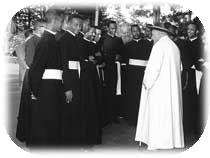
In the twenty years, then, which passed in Bulgaria, Turkey and Greece, Msgr. Roncalli knew the "separated brothers" and the vast world of Islam; and later, as Nunzio in France and Cardinal of Venice, he had to visit Lebanon, Tunisia, Algeria and Morocco, reporting intense impressions, as he wrote in a letter to the mayor of Florence, La Pira (19 September 1958): "I will tell you in confidence that since the Lord led me on the ways of the world to the meeting with men and civilizations different from the Christian ... I have shared the daily" hours "of the breviary so as to embrace the East and the prayer West...". Later, as Cardinal of Venice he participated in some important missionary events: on February 17, 1957 he pronounced the official speech in Parma in commemoration of Mgr. Conforti, founder of the Xaverian Missionary Institute and in September of the same year took part in the National Missionary Congress of Padua, holding the final address.
|
THE PATRIARCH IN MILAN |
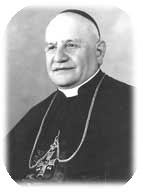
A few months later, on 3 March 1958, card. Roncalli was in Milan, at the PIME headquarters, on the occasion of the transfer from Venice to Milan of the body of Patriarch Ramazzotti, his predecessor on the Chair of San Marco and founder of the Milan Foreign Missions. On that occasion, card. Roncalli gave an important missionary speech, recalling the precedents of his life that recalled his love for the missions. He said among other things: "I remember the first time that Providence led me to the Institute of Foreign Missions of Milan in via Monterosa, in the autumn of 1910, almost half a century ago, for the delivery of the crucifix to a beautiful group of missionaries In the confiding conversations with some of the elderly returned from the fields of evangelization, I could taste the joy of those encounters ... I felt like I was seized by an ineffable tenderness, educating my spirit to the most lively admiration and interest for those who he felt called and responded by running through that bold and mysterious way ".
|
WHEN A POPE DIES |
.
All surprised once again. As for the beginning of the Council, his illness was also a flash of lightning for the public. That he knew how to live by offering it for 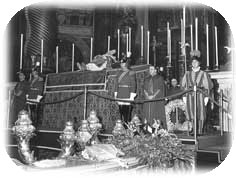 the good of the Holy Church and for the love of Jesus. If someone had said a year before that the Pope would not reach the summer of 1963, they probably would have given him a fool. In fact Pope Roncalli was known for his iron health, which he had repeatedly announced peacefully and the hardships, travels and speeches that he constantly underwent, now in his eighties, could not be explained otherwise than by his excellent health state. It is difficult today to say when the Pope had the clear awareness of his incurable evil, a malignant tumor that had nested in his stomach: it is certain that at last he continued to work without sparing himself and never lost his confident optimism, which was then solid faith in God and serene abandonment to the will of
the good of the Holy Church and for the love of Jesus. If someone had said a year before that the Pope would not reach the summer of 1963, they probably would have given him a fool. In fact Pope Roncalli was known for his iron health, which he had repeatedly announced peacefully and the hardships, travels and speeches that he constantly underwent, now in his eighties, could not be explained otherwise than by his excellent health state. It is difficult today to say when the Pope had the clear awareness of his incurable evil, a malignant tumor that had nested in his stomach: it is certain that at last he continued to work without sparing himself and never lost his confident optimism, which was then solid faith in God and serene abandonment to the will of 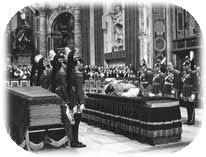 Providence. II prof. Gasbarrini - physician, the pontifical doctor, who was always with him - so he tells of the last days: "Several times in the decisive days I heard him say:" May the Lord's will be done ". And again:" Dear professor, don't worry, my bags are always ready. When it is time to leave I will not waste time. "His conscience completely abandoned him only at the end, but for many days, in moments of lucidity, he could read the newspapers, spend time with the visitors, even deal with the government of the Church. he often had excruciating pain, which he endured with great courage.On June 3, Monday, at half past seven in the evening, we were gathered in the next room, and in front of the television we watched mute at the solemn Mass that Cardinal Traglia was celebrating in the churchyard of St. Pietro, in front of an immense and silent crowd, every now and then I heard the wheezing breathing of Giovanni XXIII, always weaker and dimmer. I returned to his bed and took his hand in my hands. he felt more on his wrist. I leaned over his heart, at the very moment when, raising his head, I murmured: "He died," below, in the square, the function ended with the words "Ite, Missa est". The clear, distinct, sounds seemed symbolic to me. A heavenly viaticum to the soul of an incomparable Pope. My eyes were full of tears. At that moment someone lit a great light in the room ".
Providence. II prof. Gasbarrini - physician, the pontifical doctor, who was always with him - so he tells of the last days: "Several times in the decisive days I heard him say:" May the Lord's will be done ". And again:" Dear professor, don't worry, my bags are always ready. When it is time to leave I will not waste time. "His conscience completely abandoned him only at the end, but for many days, in moments of lucidity, he could read the newspapers, spend time with the visitors, even deal with the government of the Church. he often had excruciating pain, which he endured with great courage.On June 3, Monday, at half past seven in the evening, we were gathered in the next room, and in front of the television we watched mute at the solemn Mass that Cardinal Traglia was celebrating in the churchyard of St. Pietro, in front of an immense and silent crowd, every now and then I heard the wheezing breathing of Giovanni XXIII, always weaker and dimmer. I returned to his bed and took his hand in my hands. he felt more on his wrist. I leaned over his heart, at the very moment when, raising his head, I murmured: "He died," below, in the square, the function ended with the words "Ite, Missa est". The clear, distinct, sounds seemed symbolic to me. A heavenly viaticum to the soul of an incomparable Pope. My eyes were full of tears. At that moment someone lit a great light in the room ".
|
11th OCTOBER 1962 |
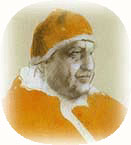
This day marks the solemn opening of the Ecumenical Council. The chronicle is in all the newspapers, and for Rome it is in the exultant hearts of all. I thank the Lord who made me not unworthy of the honor of opening in his name this beginning of great graces for his holy Church. He arranged that the first spark that he prepared, for three years, this event came out of my mouth and my heart. I was willing to give up even the joy of this beginning. With the same calm I repeat the fiat voluntas tua about maintaining myself at this first place of service for all the time and for all the circumstances of my humble life or to feel arrested at any moment, because this commitment to proceed, to continue and to finish steps to my successor. Fiat voluntas tua, sicelo in caelo et in terra [Your will be done on earth as it is in heaven]. (Opening speech to Council)
Fr.. Piero Gheddo (P.I.M.E.) on the life of Pope John in the unique October 2000 issue of the monthly "Missionari del P.I.M.E."







 Home
Home LIFE
LIFE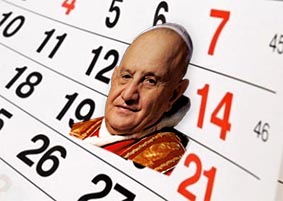 MAIN DATES
MAIN DATES FLASHES OF THE LIFE (BY FR. GHEDDO)
FLASHES OF THE LIFE (BY FR. GHEDDO)